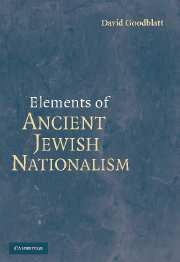Book contents
- Frontmatter
- Contents
- List of Abbreviations
- Preface
- 1 Theoretical Considerations: Nationalism and Ethnicity in Antiquity
- 2 Constructing Jewish Nationalism: The Role of Scripture
- 3 Constructing Jewish Nationalism: The Hebrew Language
- 4 A Kingdom of Priests: The Priestly Component in Ancient Jewish Nationalism
- 5 Israel Nationalism
- 6 Judah Nationalism
- 7 Zion Nationalism
- 8 Conclusions: Jewish Nationalism – What Rose and What Fell?
- Bibliography
- Author Index
- Index
6 - Judah Nationalism
Published online by Cambridge University Press: 20 July 2009
- Frontmatter
- Contents
- List of Abbreviations
- Preface
- 1 Theoretical Considerations: Nationalism and Ethnicity in Antiquity
- 2 Constructing Jewish Nationalism: The Role of Scripture
- 3 Constructing Jewish Nationalism: The Hebrew Language
- 4 A Kingdom of Priests: The Priestly Component in Ancient Jewish Nationalism
- 5 Israel Nationalism
- 6 Judah Nationalism
- 7 Zion Nationalism
- 8 Conclusions: Jewish Nationalism – What Rose and What Fell?
- Bibliography
- Author Index
- Index
Summary
According to the biblical narratives, judah was one of the twelve sons of Jacob/Israel. All the sons engendered tribes that bore their names, and these constitute the twelve tribes of Israel. Thus the tribe of Judah was one of the twelve, and members of the tribe were part of “the sons/children of Israel.” The biblical account further related how a member of the tribe of Judah, David, became king of the united Israelite monarchy. Though the united monarchy split in the time of his grandson, the dynasty founded by David retained the kingship of the rump southern kingdom that took the name “Judah.” As already noted, some skeptical scholars doubt the existence of the united monarchy and even the existence of a historical David. Even more moderate critics debate the nature of the relation between the tribe of Judah and the tribes that formed the northern kingdom of Israel. Despite all these doubts and debates, the existence of an Iron Age kingdom of Judah is beyond question. Assyrian and Neo-Babylonian epigraphic material attests such a state from the late eighth century b.c.e. onward. The precise status and fate of this territory during the half century of Neo-Babylonian domination is unclear. In any case, “Judah” appears in the Persian period as the name of the imperial subprovince located on (part of) the territory of the former kingdom. Thus the Persian-appointed governor bore the title “החפ of Judah” as both biblical and extrabiblical evidence attests.
- Type
- Chapter
- Information
- Elements of Ancient Jewish Nationalism , pp. 140 - 166Publisher: Cambridge University PressPrint publication year: 2006

